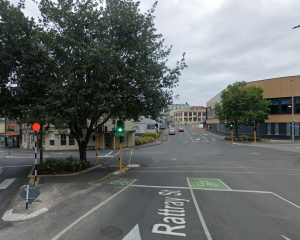A new charge targeting property developers would do more than hit those developers in the hip pocket - it would suffocate development in Dunedin, and bring growth to a grinding halt, city councillors heard yesterday.
A hearing on a draft development contributions policy was told by G.J. Gardner Homes Otago franchise owner Laurie Mains that the charge would cut deeply into his business, an argument backed up yesterday by developers, surveyors, property investors and others.
"I am accurate when I say there will be a significant downturn if this tax comes in," Mr Mains said.
The possibility of future legal action raised its head too, when Colin Withnall QC, for Silversprings Ltd, said under the Local Government Act, contributions could only be required if new or additional assets, or assets with increased capacity were required.
"I'm sorry, it's going to be a feast for the lawyers," he said.
Mayor Dave Cull began the hearing, which will be held over three days, by saying the context of the draft policy was "what the Dunedin City Council could - and I stress could - legally charge, using the formula set out by the Government".
Development contributions are charges paid by property developers to meet demands on infrastructure such as water and wastewater, roads and reserves.
Under proposed changes, developments placing additional demand on infrastructure could attract extra charges.
The changes could also affect individual property owners, with one homeowner recently discovering under the policy he could face a possible $20,000 council fee to split his property into two.
Some of the many arguments from submitters against the policy included that the low rate of growth in the city meant the policy was unjustified.
The cost of the contribution was too high to be passed on to consumers, too high to be absorbed by developers, and would have a significant negative economic impact on the city, affecting the many industries tied in to the development area.
Some submitters questioned the motivation behind the policy, with concerns it was driven by the need to recoup the cost of past spending decisions.
Mr Mains told the hearing his company had built more than 400 homes and 800 garages and commercial buildings since 1986.
"My business currently has significant numbers of Christchurch people looking to relocate in Dunedin," he said.
But the tight budgets they worked to meant any additional cost would result in them building elsewhere, with three having already done so.
In 1997, when GST came in, business dropped to 30% of what it had been, and the development contribution was comparable.
Homeowners having to pay the contribution, then rates, meant the council would be "double-dipping".
Mr Main's arguments were backed up by Otago Surveying Company director Paul Haddon.
He said a reserves contribution that had been introduced had added about $5000 to the cost per section, a cost that was "almost tolerable".
But the development contribution was "almost four-fold" that cost, and was not.
Mr Haddon said the recession meant it was being introduced at the worst possible time.
"The added cost will act as as a suppressor to development.
"There is an anti-development theme running through this policy," he told the hearings committee.
"It is self-defeating.""I don't believe the writers of this policy, as well as you as councillors, have come to grips with the negative effects it could have."
Calvin Fisher, of Saddle Views Estate Ltd, said the policy was "unfair and inefficient".
"Developers already pay for all new network infrastructure required for a subdivision and then gift these assets to the council."
Asked by Cr Lee Vandervis about paying for infrastructure like the Tahuna outfall pipe and upgrade, Mr Fisher questioned whether Dunedin had the population growth that meant that development had been necessary.
Developer Kim Taylor argued in his submission the cost of infrastructure should be paid by ratepayers.
He told the committee the tax-paying public throughout the world was "demanding no further support for the fraudulent banking sector from their politicians".
Cr Kate Wilson, who was chairwoman at the time, asked Mr Taylor to stick to the subject of the hearings.
Otago Property Investors Association representative Cliff Seque said the only real population growth in the city had occurred in Dunedin North, and was associated with the University of Otago.
University property services division resource planner Katrina Roos called for levies to be tied to capital spending, rather than being used for unrelated projects, like the Forsyth Barr Stadium.
The hearing continues today.











